#how to search on facebook ad library
Explore tagged Tumblr posts
Text
youtube
Stop Facebook From Stealing Your Ad Budget! ( It's Free)
Master Facebook Ads with the Ad Library. Find high-converting ads your competitors are ALREADY using.
This video shows you:
What the Ad Library is and how to access it.
How to spy on competitor ads (shh!) and find winning strategies.
How to target specific keywords and locations for laser-focused research.
How to save searches and streamline your ad planning.
#facebook ad library#meta ad library#facebook ad library tutorial#meta ad library tutorial#how to use facebook ad library#how to use meta ad library#what is facebook ad library#what is meta ad library#facebook ads#meta ads#facebook ad library tricks#fb ads library#meta ads library#ad library#ads library#find competitors facebook ads#find competitors ads on facebook#how to search on facebook ad library#how to search on meta ad library#facebook ads library#Youtube
1 note
·
View note
Text
A lawsuit filed Wednesday against Meta argues that US law requires the company to let people use unofficial add-ons to gain more control over their social feeds.
It’s the latest in a series of disputes in which the company has tussled with researchers and developers over tools that give users extra privacy options or that collect research data. It could clear the way for researchers to release add-ons that aid research into how the algorithms on social platforms affect their users, and it could give people more control over the algorithms that shape their lives.
The suit was filed by the Knight First Amendment Institute at Columbia University on behalf of researcher Ethan Zuckerman, an associate professor at the University of Massachusetts—Amherst. It attempts to take a federal law that has generally shielded social networks and use it as a tool forcing transparency.
Section 230 of the Communications Decency Act is best known for allowing social media companies to evade legal liability for content on their platforms. Zuckerman’s suit argues that one of its subsections gives users the right to control how they access the internet, and the tools they use to do so.
“Section 230 (c) (2) (b) is quite explicit about libraries, parents, and others having the ability to control obscene or other unwanted content on the internet,” says Zuckerman. “I actually think that anticipates having control over a social network like Facebook, having this ability to sort of say, ‘We want to be able to opt out of the algorithm.’”
Zuckerman’s suit is aimed at preventing Facebook from blocking a new browser extension for Facebook that he is working on called Unfollow Everything 2.0. It would allow users to easily “unfollow” friends, groups, and pages on the service, meaning that updates from them no longer appear in the user’s newsfeed.
Zuckerman says that this would provide users the power to tune or effectively disable Facebook’s engagement-driven feed. Users can technically do this without the tool, but only by unfollowing each friend, group, and page individually.
There’s good reason to think Meta might make changes to Facebook to block Zuckerman’s tool after it is released. He says he won’t launch it without a ruling on his suit. In 2020, the company argued that the browser Friendly, which had let users search and reorder their Facebook news feeds as well as block ads and trackers, violated its terms of service and the Computer Fraud and Abuse Act. In 2021, Meta permanently banned Louis Barclay, a British developer who had created a tool called Unfollow Everything, which Zuckerman’s add-on is named after.
“I still remember the feeling of unfollowing everything for the first time. It was near-miraculous. I had lost nothing, since I could still see my favorite friends and groups by going to them directly,” Barclay wrote for Slate at the time. “But I had gained a staggering amount of control. I was no longer tempted to scroll down an infinite feed of content. The time I spent on Facebook decreased dramatically.”
The same year, Meta kicked off from its platform some New York University researchers who had created a tool that monitored the political ads people saw on Facebook. Zuckerman is adding a feature to Unfollow Everything 2.0 that allows people to donate data from their use of the tool to his research project. He hopes to use the data to investigate whether users of his add-on who cleanse their feeds end up, like Barclay, using Facebook less.
Sophia Cope, staff attorney at the Electronic Frontier Foundation, a digital rights group, says that the core parts of Section 230 related to platforms’ liability for content posted by users have been clarified through potentially thousands of cases. But few have specifically dealt with the part of the law Zuckerman’s suit seeks to leverage.
“There isn’t that much case law on that section of the law, so it will be interesting to see how a judge breaks it down,” says Cope. Zuckerman is a member of the EFF’s board of advisers.
John Morris, a principal at the Internet Society, a nonprofit that promotes open development of the internet, says that, to his knowledge, Zuckerman’s strategy “hasn’t been used before, in terms of using Section 230 to grant affirmative rights to users,” noting that a judge would likely take that claim seriously.
Meta has previously suggested that allowing add-ons that modify how people use its services raises security and privacy concerns. But Daphne Keller, director of the Program on Platform Regulation at Stanford's Cyber Policy Center, says that Zuckerman’s tool may be able to fairly push back on such an accusation.“The main problem with tools that give users more control over content moderation on existing platforms often has to do with privacy,” she says. “But if all this does is unfollow specified accounts, I would not expect that problem to arise here."
Even if a tool like Unfollow Everything 2.0 didn’t compromise users’ privacy, Meta might still be able to argue that it violates the company’s terms of service, as it did in Barclay’s case.
“Given Meta’s history, I could see why he would want a preemptive judgment,” says Cope. “He’d be immunized against any civil claim brought against him by Meta.”
And though Zuckerman says he would not be surprised if it takes years for his case to wind its way through the courts, he believes it’s important. “This feels like a particularly compelling case to do at a moment where people are really concerned about the power of algorithms,” he says.
370 notes
·
View notes
Text
The moral injury of having your work enshittified

This Monday (November 27), I'm appearing at the Toronto Metro Reference Library with Facebook whistleblower Frances Haugen.
On November 29, I'm at NYC's Strand Books with my novel The Lost Cause, a solarpunk tale of hope and danger that Rebecca Solnit called "completely delightful."

This week, I wrote about how the Great Enshittening – in which all the digital services we rely on become unusable, extractive piles of shit – did not result from the decay of the morals of tech company leadership, but rather, from the collapse of the forces that discipline corporate wrongdoing:
https://locusmag.com/2023/11/commentary-by-cory-doctorow-dont-be-evil/
The failure to enforce competition law allowed a few companies to buy out their rivals, or sell goods below cost until their rivals collapsed, or bribe key parts of their supply chain not to allow rivals to participate:
https://www.engadget.com/google-reportedly-pays-apple-36-percent-of-ad-search-revenues-from-safari-191730783.html
The resulting concentration of the tech sector meant that the surviving firms were stupendously wealthy, and cozy enough that they could agree on a common legislative agenda. That regulatory capture has allowed tech companies to violate labor, privacy and consumer protection laws by arguing that the law doesn't apply when you use an app to violate it:
https://pluralistic.net/2023/04/12/algorithmic-wage-discrimination/#fishers-of-men
But the regulatory capture isn't just about preventing regulation: it's also about creating regulation – laws that make it illegal to reverse-engineer, scrape, and otherwise mod, hack or reconfigure existing services to claw back value that has been taken away from users and business customers. This gives rise to Jay Freeman's perfectly named doctrine of "felony contempt of business-model," in which it is illegal to use your own property in ways that anger the shareholders of the company that sold it to you:
https://pluralistic.net/2023/11/09/lead-me-not-into-temptation/#chamberlain
Undisciplined by the threat of competition, regulation, or unilateral modification by users, companies are free to enshittify their products. But what does that actually look like? I say that enshittification is always precipitated by a lost argument.
It starts when someone around a board-room table proposes doing something that's bad for users but good for the company. If the company faces the discipline of competition, regulation or self-help measures, then the workers who are disgusted by this course of action can say, "I think doing this would be gross, and what's more, it's going to make the company poorer," and so they win the argument.
But when you take away that discipline, the argument gets reduced to, "Don't do this because it would make me ashamed to work here, even though it will make the company richer." Money talks, bullshit walks. Let the enshittification begin!
https://pluralistic.net/2023/11/22/who-wins-the-argument/#corporations-are-people-my-friend
But why do workers care at all? That's where phrases like "don't be evil" come into the picture. Until very recently, tech workers participated in one of history's tightest labor markets, in which multiple companies with gigantic war-chests bid on their labor. Even low-level employees routinely fielded calls from recruiters who dangled offers of higher salaries and larger stock grants if they would jump ship for a company's rival.
Employers built "campuses" filled with lavish perks: massages, sports facilities, daycare, gourmet cafeterias. They offered workers generous benefit packages, including exotic health benefits like having your eggs frozen so you could delay fertility while offsetting the risks normally associated with conceiving at a later age.
But all of this was a transparent ruse: the business-case for free meals, gyms, dry-cleaning, catering and massages was to keep workers at their laptops for 10, 12, or even 16 hours per day. That egg-freezing perk wasn't about helping workers plan their families: it was about thumbing the scales in favor of working through your entire twenties and thirties without taking any parental leave.
In other words, tech employers valued their employees as a means to an end: they wanted to get the best geeks on the payroll and then work them like government mules. The perks and pay weren't the result of comradeship between management and labor: they were the result of the discipline of competition for labor.
This wasn't really a secret, of course. Big Tech workers are split into two camps: blue badges (salaried employees) and green badges (contractors). Whenever there is a slack labor market for a specific job or skill, it is converted from a blue badge job to a green badge job. Green badges don't get the food or the massages or the kombucha. They don't get stock or daycare. They don't get to freeze their eggs. They also work long hours, but they are incentivized by the fear of poverty.
Tech giants went to great lengths to shield blue badges from green badges – at some Google campuses, these workforces actually used different entrances and worked in different facilities or on different floors. Sometimes, green badge working hours would be staggered so that the armies of ragged clickworkers would not be lined up to badge in when their social betters swanned off the luxury bus and into their airy adult kindergartens.
But Big Tech worked hard to convince those blue badges that they were truly valued. Companies hosted regular town halls where employees could ask impertinent questions of their CEOs. They maintained freewheeling internal social media sites where techies could rail against corporate foolishness and make Dilbert references.
And they came up with mottoes.
Apple told its employees it was a sound environmental steward that cared about privacy. Apple also deliberately turned old devices into e-waste by shredding them to ensure that they wouldn't be repaired and compete with new devices:
https://pluralistic.net/2023/09/22/vin-locking/#thought-differently
And even as they were blocking Facebook's surveillance tools, they quietly built their own nonconsensual mass surveillance program and lied to customers about it:
https://pluralistic.net/2022/11/14/luxury-surveillance/#liar-liar
Facebook told employees they were on a "mission to connect every person in the world," but instead deliberately sowed discontent among its users and trapped them in silos that meant that anyone who left Facebook lost all their friends:
https://www.eff.org/deeplinks/2021/08/facebooks-secret-war-switching-costs
And Google promised its employees that they would not "be evil" if they worked at Google. For many googlers, that mattered. They wanted to do something good with their lives, and they had a choice about who they would work for. What's more, they did make things that were good. At their high points, Google Maps, Google Mail, and of course, Google Search were incredible.
My own life was totally transformed by Maps: I have very poor spatial sense, need to actually stop and think to tell my right from my left, and I spent more of my life at least a little lost and often very lost. Google Maps is the cognitive prosthesis I needed to become someone who can go anywhere. I'm profoundly grateful to the people who built that service.
There's a name for phenomenon in which you care so much about your job that you endure poor conditions and abuse: it's called "vocational awe," as coined by Fobazi Ettarh:
https://www.inthelibrarywiththeleadpipe.org/2018/vocational-awe/
Ettarh uses the term to apply to traditionally low-waged workers like librarians, teachers and nurses. In our book Chokepoint Capitalism, Rebecca Giblin and I talked about how it applies to artists and other creative workers, too:
https://chokepointcapitalism.com/
But vocational awe is also omnipresent in tech. The grandiose claims to be on a mission to make the world a better place are not just puffery – they're a vital means of motivating workers who can easily quit their jobs and find a new one to put in 16-hour days. The massages and kombucha and egg-freezing are not framed as perks, but as logistical supports, provided so that techies on an important mission can pursue a shared social goal without being distracted by their balky, inconvenient meatsuits.
Steve Jobs was a master of instilling vocational awe. He was full of aphorisms like "we're here to make a dent in the universe, otherwise why even be here?" Or his infamous line to John Sculley, whom he lured away from Pepsi: "Do you want to sell sugar water for the rest of your life or come with me and change the world?"
Vocational awe cuts both ways. If your workforce actually believes in all that high-minded stuff, if they actually sacrifice their health, family lives and self-care to further the mission, they will defend it. That brings me back to enshittification, and the argument: "If we do this bad thing to the product I work on, it will make me hate myself."
The decline in market discipline for large tech companies has been accompanied by a decline in labor discipline, as the market for technical work grew less and less competitive. Since the dotcom collapse, the ability of tech giants to starve new entrants of market oxygen has shrunk techies' dreams.
Tech workers once dreamed of working for a big, unwieldy firm for a few years before setting out on their own to topple it with a startup. Then, the dream shrank: work for that big, clumsy firm for a few years, then do a fake startup that makes a fake product that is acquihired by your old employer, as an incredibly inefficient and roundabout way to get a raise and a bonus.
Then the dream shrank again: work for a big, ugly firm for life, but get those perks, the massages and the kombucha and the stock options and the gourmet cafeteria and the egg-freezing. Then it shrank again: work for Google for a while, but then get laid off along with 12,000 co-workers, just months after the company does a stock buyback that would cover all those salaries for the next 27 years:
https://pluralistic.net/2023/09/10/the-proletarianization-of-tech-workers/
Tech workers' power was fundamentally individual. In a tight labor market, tech workers could personally stand up to their bosses. They got "workplace democracy" by mouthing off at town hall meetings. They didn't have a union, and they thought they didn't need one. Of course, they did need one, because there were limits to individual power, even for the most in-demand workers, especially when it came to ghastly, long-running sexual abuse from high-ranking executives:
https://www.nytimes.com/2018/10/25/technology/google-sexual-harassment-andy-rubin.html
Today, atomized tech workers who are ordered to enshittify the products they take pride in are losing the argument. Workers who put in long hours, missed funerals and school plays and little league games and anniversaries and family vacations are being ordered to flush that sacrifice down the toilet to grind out a few basis points towards a KPI.
It's a form of moral injury, and it's palpable in the first-person accounts of former workers who've exited these large firms or the entire field. The viral "Reflecting on 18 years at Google," written by Ian Hixie, vibrates with it:
https://ln.hixie.ch/?start=1700627373
Hixie describes the sense of mission he brought to his job, the workplace democracy he experienced as employees' views were both solicited and heeded. He describes the positive contributions he was able to make to a commons of technical standards that rippled out beyond Google – and then, he says, "Google's culture eroded":
Decisions went from being made for the benefit of users, to the benefit of Google, to the benefit of whoever was making the decision.
In other words, techies started losing the argument. Layoffs weakened worker power – not just to defend their own interest, but to defend the users interests. Worker power is always about more than workers – think of how the 2019 LA teachers' strike won greenspace for every school, a ban on immigration sweeps of students' parents at the school gates and other community benefits:
https://pluralistic.net/2023/04/23/a-collective-bargain/
Hixie attributes the changes to a change in leadership, but I respectfully disagree. Hixie points to the original shareholder letter from the Google founders, in which they informed investors contemplating their IPO that they were retaining a controlling interest in the company's governance so that they could ignore their shareholders' priorities in favor of a vision of Google as a positive force in the world:
https://abc.xyz/investor/founders-letters/ipo-letter/
Hixie says that the leadership that succeeded the founders lost sight of this vision – but the whole point of that letter is that the founders never fully ceded control to subsequent executive teams. Yes, those executive teams were accountable to the shareholders, but the largest block of voting shares were retained by the founders.
I don't think the enshittification of Google was due to a change in leadership – I think it was due to a change in discipline, the discipline imposed by competition, regulation and the threat of self-help measures. Take ads: when Google had to contend with one-click adblocker installation, it had to constantly balance the risk of making users so fed up that they googled "how do I block ads?" and then never saw another ad ever again.
But once Google seized the majority of the mobile market, it was able to funnel users into apps, and reverse-engineering an app is a felony (felony contempt of business-model) under Section 1201 of the Digital Millennium Copyright Act. An app is just a web-page wrapped in enough IP to make it a crime to install an ad-blocker.
And as Google acquired control over the browser market, it was likewise able to reduce the self-help measures available to browser users who found ads sufficiently obnoxious to trigger googling "how do I block ads?" The apotheosis of this is the yearslong campaign to block adblockers in Chrome, which the company has sworn it will finally do this coming June:
https://www.tumblr.com/tevruden/734352367416410112/you-have-until-june-to-dump-chrome
My contention here is not that Google's enshittification was precipitated by a change in personnel via the promotion of managers who have shitty ideas. Google's enshittification was precipitated by a change in discipline, as the negative consequences of heeding those shitty ideas were abolished thanks to monopoly.
This is bad news for people like me, who rely on services like Google Maps as cognitive prostheses. Elizabeth Laraki, one of the original Google Maps designers, has published a scorching critique of the latest GMaps design:
https://twitter.com/elizlaraki/status/1727351922254852182
Laraki calls out numerous enshittificatory design-choices that have left Maps screens covered in "crud" – multiple revenue-maximizing elements that come at the expense of usability, shifting value from users to Google.
What Laraki doesn't say is that these UI elements are auctioned off to merchants, which means that the business that gives Google the most money gets the greatest prominence in Maps, even if it's not the best merchant. That's a recurring motif in enshittified tech platforms, most notoriously Amazon, which makes $31b/year auctioning off top search placement to companies whose products aren't relevant enough to your query to command that position on their own:
https://pluralistic.net/2023/04/25/greedflation/#commissar-bezos
Enshittification begets enshittification. To succeed on Amazon, you must divert funds from product quality to auction placement, which means that the top results are the worst products:
https://pluralistic.net/2023/11/06/attention-rents/#consumer-welfare-queens
The exception is searches for Apple products: Apple and Amazon have a cozy arrangement that means that searches for Apple products are a timewarp back to the pre-enshittification Amazon, when the company worried enough about losing your business to heed the employees who objected to sacrificing search quality as part of a merchant extortion racket:
https://www.businessinsider.com/amazon-gives-apple-special-treatment-while-others-suffer-junk-ads-2023-11
Not every tech worker is a tech bro, in other words. Many workers care deeply about making your life better. But the microeconomics of the boardroom in a monopolized tech sector rewards the worst people and continuously promotes them. Forget the Peter Principle: tech is ruled by the Sam Principle.
As OpenAI went through four CEOs in a single week, lots of commentators remarked on Sam Altman's rise and fall and rise, but I only found one commentator who really had Altman's number. Writing in Today in Tabs, Rusty Foster nailed Altman to the wall:
https://www.todayintabs.com/p/defective-accelerationism
Altman's history goes like this: first, he founded a useless startup that raised $30m, only to be acquired and shuttered. Then Altman got a job running Y Combinator, where he somehow failed at taking huge tranches of equity from "every Stanford dropout with an idea for software to replace something Mommy used to do." After that, he founded OpenAI, a company that he claims to believe presents an existential risk to the entire human risk – which he structured so incompetently that he was then forced out of it.
His reward for this string of farcical, mounting failures? He was put back in charge of the company he mis-structured despite his claimed belief that it will destroy the human race if not properly managed.
Altman's been around for a long time. He founded his startup in 2005. There've always been Sams – of both the Bankman-Fried varietal and the Altman genus – in tech. But they didn't get to run amok. They were disciplined by their competitors, regulators, users and workers. The collapse of competition led to an across-the-board collapse in all of those forms of discipline, revealing the executives for the mediocre sociopaths they always were, and exposing tech workers' vocational awe for the shabby trick it was from the start.

If you'd like an essay-formatted version of this post to read or share, here's a link to it on pluralistic.net, my surveillance-free, ad-free, tracker-free blog:
https://pluralistic.net/2023/11/25/moral-injury/#enshittification
#pluralistic#moral injury#enshittification#worker power#google#dont be evil#monopoly#sam altman#openai#vocational awe#making a dent in the universe
562 notes
·
View notes
Note
hi hi. i saw you answer that ask about finding places to be social without alcohol and i figured i'd ask something as well. feel free to ignore if it's a dumb question, but i was wondering if you have advice for finding friends/a support group in general? specifically as someone who maybe doesn't have much money to spare most of the time?
the last time i went to a meetup i felt like i couldn't really connect to anyone. they were all talking about having jobs and houses and i just spend a lot of my time on the computer. but it hurts to see others with deep connections with people while i'm just floating around on my own. sorry if this sounds trauma dumpy. >_<
good question!
socializing is hard for everyone in the way we've structured society right now, so you're not alone. most people do not get a consistent way to socialize with others and it's hard to be able to frequent a place enough to start to get to know anyone. it's also very hard to tell what spaces and businesses are queer friendly and which ones are not
i have a small number of suggestions and i'm open to whoever wants to participate adding on. i've found that libraries have tons of groups for things that you'd never expect like DnD nights, esports/fighting game tournaments, movie viewings, Lego clubs, group meetings for certain programs in your city including activist groups, book clubs, and literally so much more. they also tend to have posters and information about fun things going on in your area such as concerts, cultural events and holidays, performances, live events, and queer locations and spaces in town
a good way to get started with this kind of thing is examining your personal hobbies and seeing if you can look up groups on social media sites such as facebook, instagram and reddit to see if you can find groups and postings about things going on in your area. if you're able to frequent an event that's even better because people will get to know you. you don't have to be a social butterfly to make friends, often times going to the same event multiple times can start a friendship
queer groups can be found on social media as long as they're safe to operate in your area. there will be a lot of alcohol at bars and clubs but often times you can find more casual spaces that host queer events like art galleries/shop, coffee shops, ice cream shops, any type of small, queer owned business. sometimes people will rent out parking lots or other spaces to create a sober space for all ages events. it will depend on how safe this is in your area. you will usually be able to find out about this on instagram or facebook, it's best to try to search for "LGBT (events, etc.)" and go from there
otherwise you can find meetups for gamers, sports fans, writers, artists, musicians, literally whatever hobbies you're in to. you can just attend certain events and not really participate, if you want to just be in a social space around other people. easing yourself into socializing works best. clubs are really for people who are highly social and can adapt to a fast paced environment. many people aren't into that and that's alright
if anyone else has any advice feel free to chip in, i wish you the best of luck, take care for now, stay safe out there
19 notes
·
View notes
Text
Facebook ADs mini-essay by me <3 (excuse any typos and grammar mistakes, please. corrections are welcome.)
★ a huge shout out to Emma @dnpbeats for sending me a link to Phil's Facebook ad library. now we have a lot to go through ★
you can see that Phil's Facebook is linked with Dan's Instagram. Dan's, on the other hand, isn't.


note: filter goes from 2018 to 2024.
Terrible Influence (TI) youtube promo video "Finally Revealing Our Secret" is running as a bought ad in: Germany, Norway, Denmark, Sweden, Finland, France, Poland (if you search for it, the ad appears but it has reached just a few people in France and Poland; the locations of the ads are in Germany). we can see who paid for these ads (Bill Bailey)*.
no TI youtube promo video as an ad in countries with actual shows: Belgium (on a screenshot as an example), Netherlands, Iceland.
note: you can select any country and see if this ad reached anyone there. countries above are those that i selected because they either have shows or are very close to the ones with shows (France). i also selected Latvia - it didn't have this specific ad. it did have WAD premiere ads because WAD was targetting worldwide (spoilers, i guess).
nothing at all in the UK. it doesn't mean the ads are not running in the UK. i personally didn't see any, but if they are out there, they are probably bought by and run via a promoter (AEG; didn't see in their library) or someone else.
local TI promo posts are running as bought ads in the USA and Canada (screenshots below). Tysons as an example. there's no information about who paid for the ads.
local TI promo posts are running as bought ads in Australia and New Zealand. there's no information about who paid for the ads. but the ads are running on more platforms than in the USA, Canada and Europe.
local TI promo posts are running as bought ads in some European countries (more on that later).
on some screenshots you can see that Phil also has ads for WAD premiere and preshow (only in Europe, Canada and Australia/NZ). in EU we can also see who paid for them (Hangtime)*.
* i don't know how true this information is. i personally don't know about any connections between Dan and Phil and these people/companies. spoilers: local TI promo posts are paid for by A Comic Soul (in the EU), and in this case, we do know the connection. but more info about local TI promo posts will be in the reblog (because Tumblr limits, ya!)
shout out to Dan for having 0 ads in his Facebook library.
Europe:
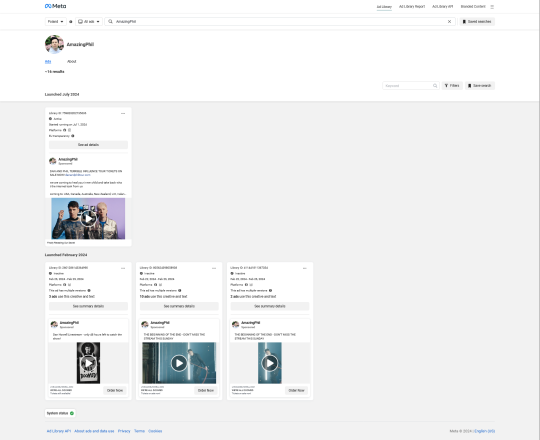
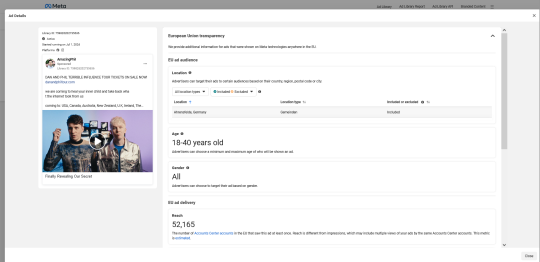
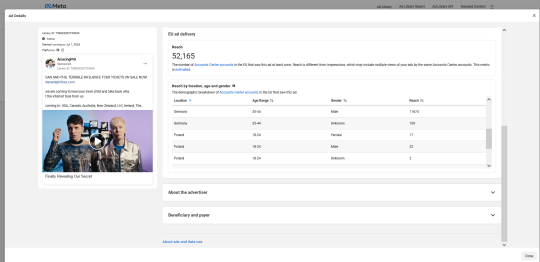
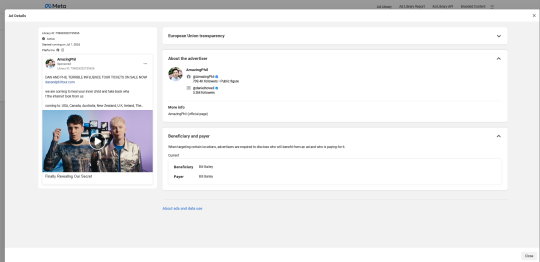
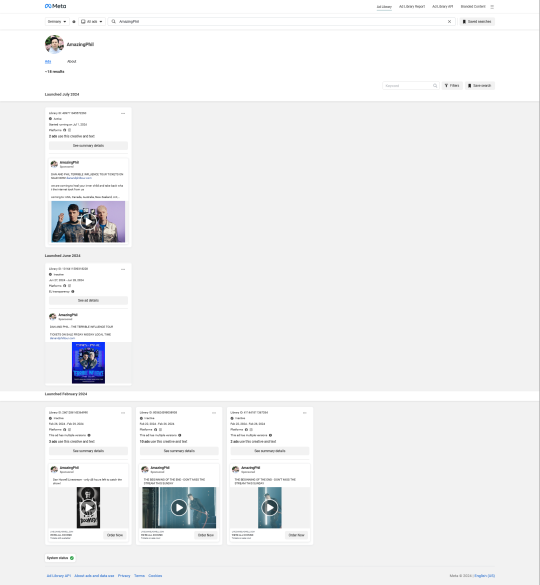
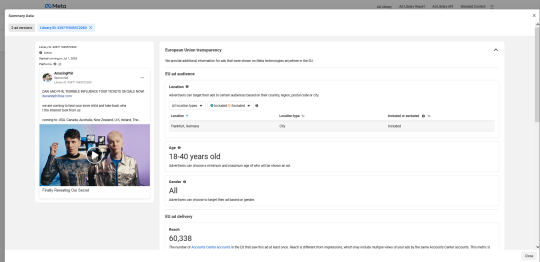
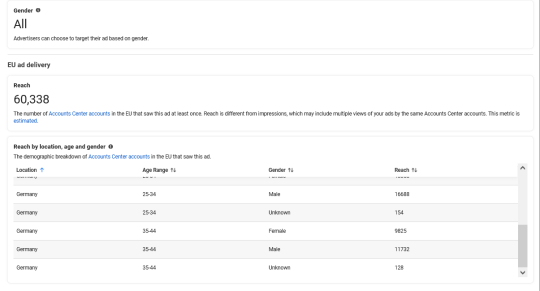
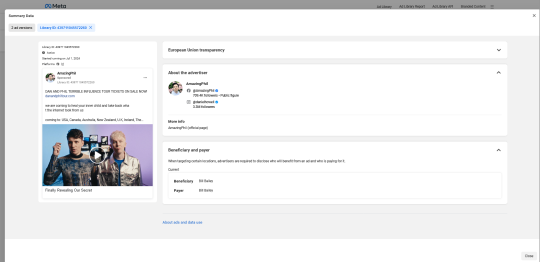
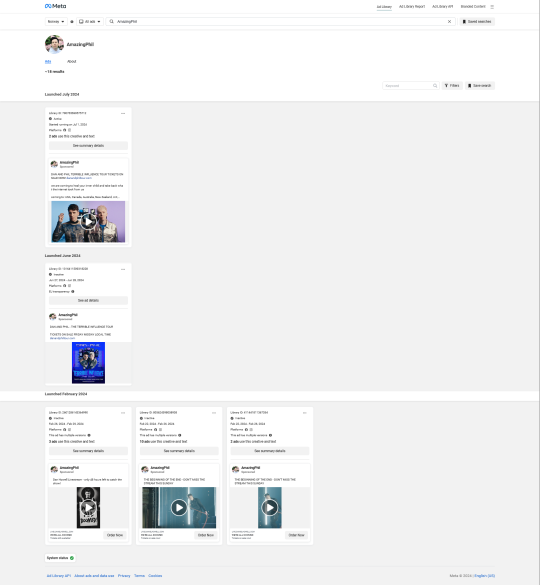
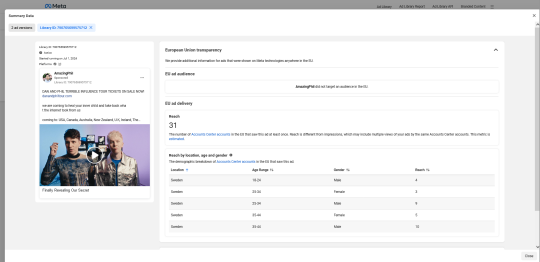
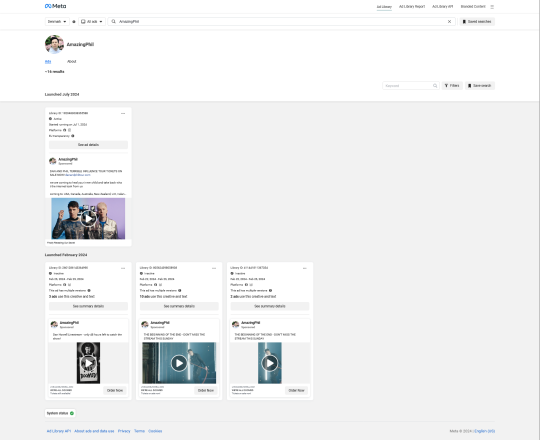
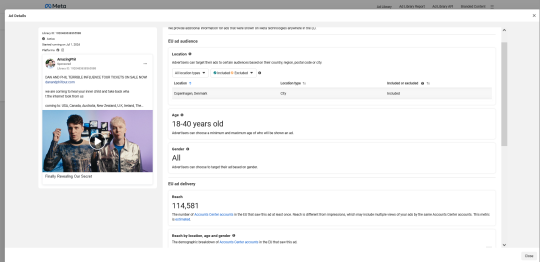
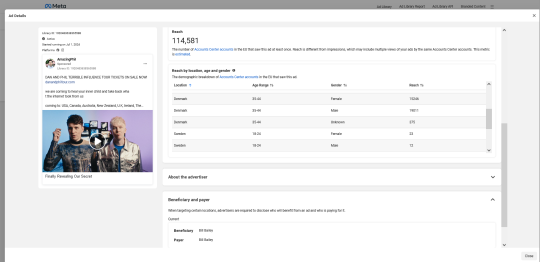
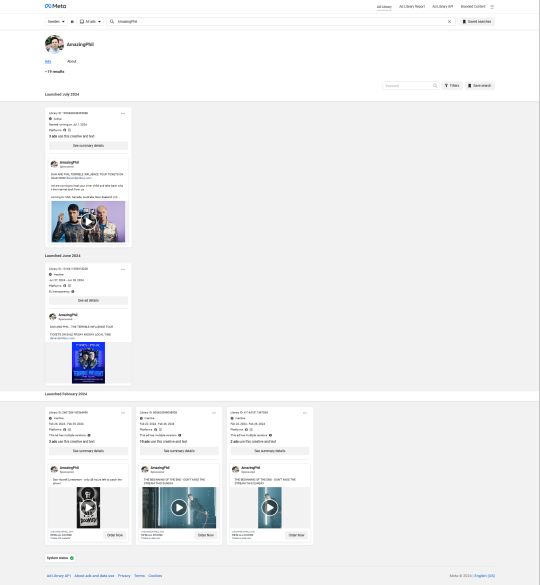
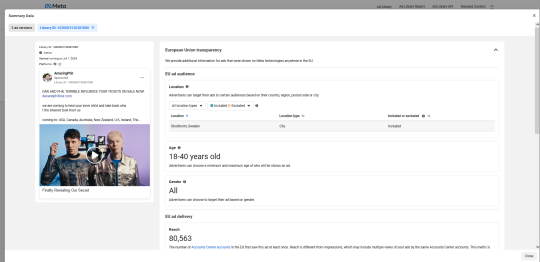
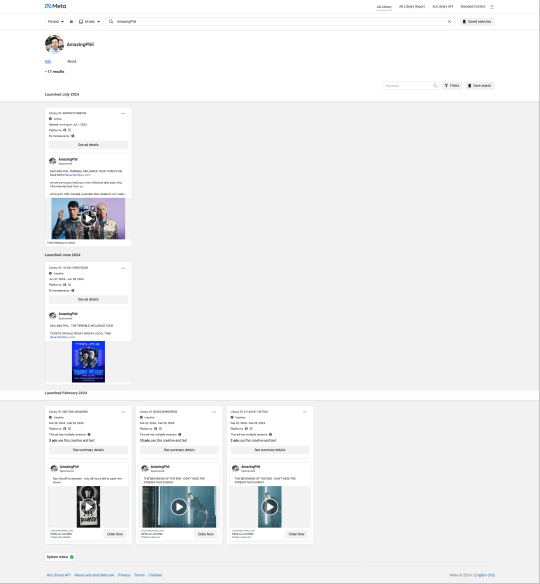
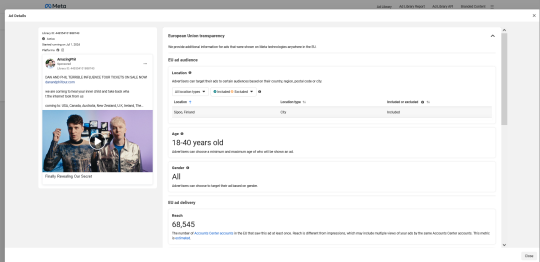
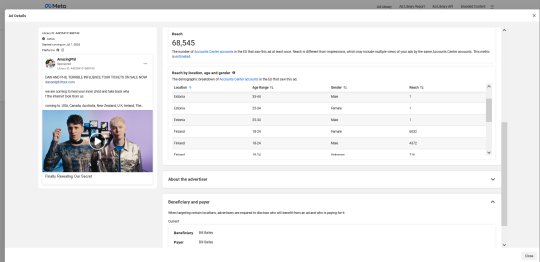
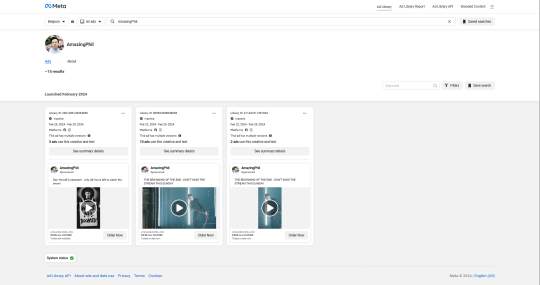
USA and Canada:

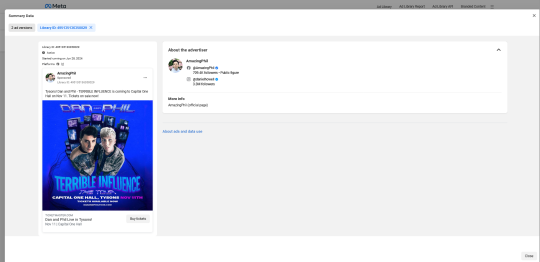
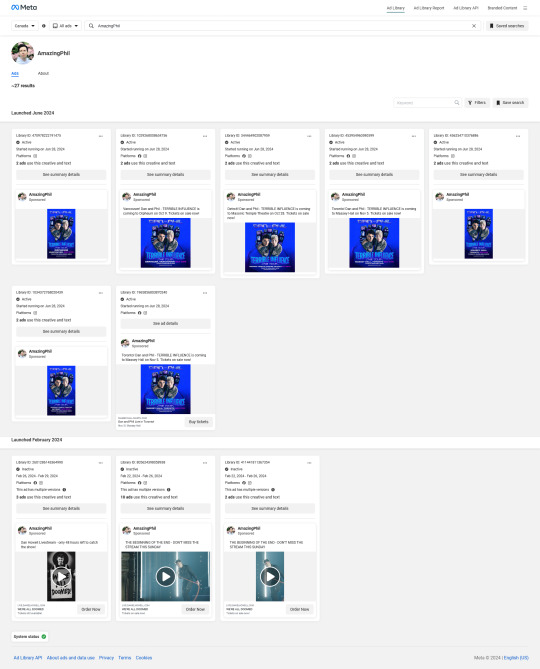
Australia and New Zealand:
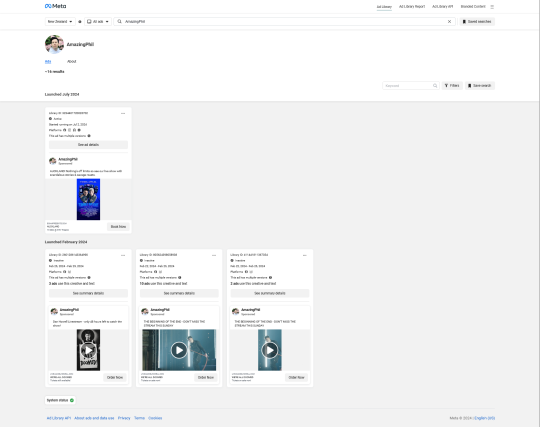
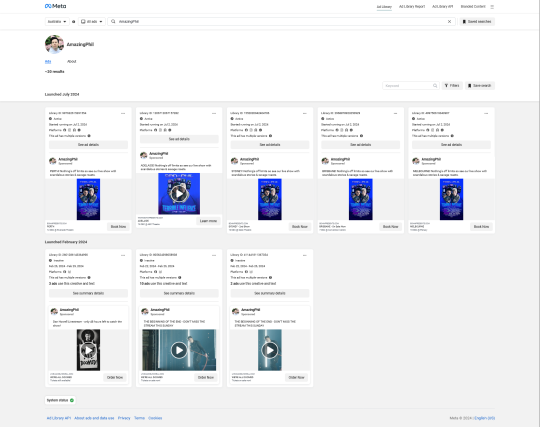
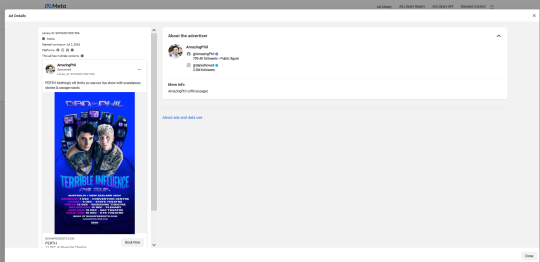
WAD premiere:
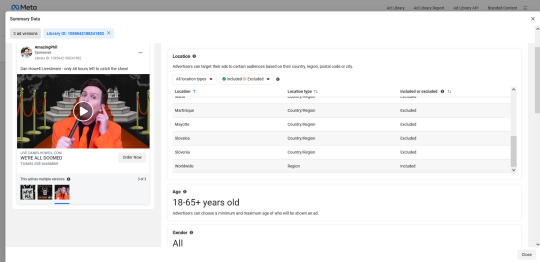
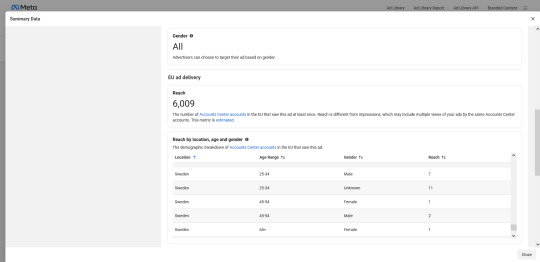
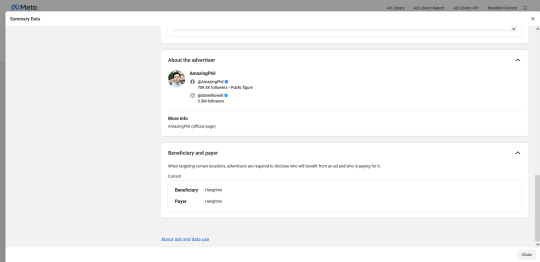
#ti promo#ti.usa#ti.europe#brother in christ i'm not tagging each us city. but all of them are there. and all canadians as well#facebook#ti.canada#ti.australia#ti.new zealand#wad premiere
26 notes
·
View notes
Note
Hoping, praying, wishing that you're still active.
I just got my first job as a social worker and am already on my deathbed. Fresh from uni and not a clue how to do the things they're asking me to do. I'll try though.
Working with seniors, I have to do outreach. We are distributing flyers and trying to make connections for our senior day program for seniors with dementia. I have already reached out to churches, hospitals and medical clinics, community centres, and libraries. But my manager wants me to expand on that list.
I really don't know who else to contact. Do you have any suggestions? And what was your greatest obstacle working your first SW job? ♥️♥️♥️
I'm not really active, but active enough to see this ask!
Oof, frontline social work jobs are tough. I'm assuming you're in the US (though I imagine this would probably be at least somewhat applicable to other countries), so here are some ideas:
First, search your area for social work/mental health worker networking groups. Most of them are on facebook, but some of them might be elsewhere. You can google "[City name/state/region] mental health worker networking group" and see what pops up. I say this both because you'll be able to do some outreach there, but also because you deserve to connect with other mental health workers for support for yourself. Also, try reaching out to your college and see if they have a group for alumni. Again, for outreach and networking opportunities, but also to connect with other social workers for support for yourself.
As for ideas for other places to reach out to: I mean, honestly, you've hit almost all the places I could think of! Try senior centers, if you haven't already. Try other nonprofits serving seniors in your area (try looking for Medicare/Medicaid-funded organizations), assisted living facilities, independent living facilities, and retirement communities, and see if you can find any individual therapists or group therapy practices that may serve seniors.
Also, don't be afraid to stand up and advocate for yourself in your job. If you're fresh out of ideas and your manager is still pushing for more, gently push back. Think along the lines of "I've already tried everything I can think of, including x, y, and z. I'm out of ideas at the moment. Do you have any ideas of other places I can try?" If they don't, and they just expect you to come up with... something, try, "I'm not sure what else to do. If you don't have any other ideas, I'm going to [insert idea of what you can do next that's tangentially related, like, 'follow-up with the places I've already reached out to so I can keep building those connections.'] But I'll talk with you during our next check-in/meeting to see if I come up with any other ideas."
Social work jobs are hard. They are so hard. I struggled with pushing myself too hard and not having the work-life boundaries I need to last long-term. Take your time off, take your sick leave. Turn your phone off (or at least mute work people) after hours. If you can keep from adding any work apps to your phone, do. If they try to give you more work than you can do in a reasonable work week, tell them that. "I'm not able to get x done with y and z, so I'm going to prioritize y and z unless you tell me you'd like me to do something else." And don't be afraid to look for a new job if this one is going to burn you out.
(also AskAManager.org is a great resource for finding ways to advocate for yourself in the workplace. Social workers deserve better than the field gives them. You don't have to put up with it.)
5 notes
·
View notes
Text
How can you put images on posts?
Adding images to your posts can make them more visually appealing and engaging for your readers, and they can also help to illustrate your points and make your content more digestible. There are a few different ways to add images to your posts, depending on the platform you're using.
Here are the general steps on how to put images on posts:
Prepare your image: Make sure that your image is the right size and format for your platform. For example, if you're adding an image to a blog post, you'll want to make sure that the image is not too large, as this can slow down your page load times. You can also use an image editing tool to resize or crop your image to the desired size.
Upload your image: Once you have prepared your image, you can upload it to your platform. This may be done by clicking on an "Upload" button or by dragging and dropping the image into the post editor.
Position your image: Once your image is uploaded, you can position it in your post. You can choose whether to have the image appear on the left, right, or center of the post, and you can also choose whether to have the image float alongside the text or be displayed in a full-width block.
Add a caption: Once your image is positioned, you can add a caption. This is a short description of the image that will help your readers to understand what it is. A good caption should be no more than a few sentences long and should be informative and engaging.
Add alt text: Alt text is a text description of the image that is used by search engines and screen readers. It is important to add alt text to your images so that people who are unable to see the image can still understand what it is.
Here are some specific instructions on how to add images to popular platforms:
WordPress:
To add an image to a WordPress post, click on the "Add Media" button in the post editor.
Select the image you want to upload from your computer.
Click the "Insert into post" button.
Position the image in your post.
Add a caption and alt text.
Facebook:
To add an image to a Facebook post, click on the "Photo/Video" button in the status update box.
Select the image you want to upload from your computer.
Add a caption.
Click the "Share" button.
Twitter:
To add an image to a Tweet, click on the "Image" button in the tweet composer.
Select the image you want to upload from your computer.
Add a caption.
Click the "Tweet" button.
Instagram:
To add an image to an Instagram post, open the Instagram app and tap on the "+" button.
Select the image you want to upload from your phone's photo library.
Edit the image as desired.
Add a caption and hashtags.
Tap the "Share" button.
If you found this answer helpful, please like and leave a comment. You can also follow me for more helpful tips and tricks.
#image post#image description in alt#image optimization#image described#blogger community#bloggers on tumblr#information overload
6 notes
·
View notes
Text
Exploring the Facebook Ads Library: Insights

Unlocking the Power of Facebook Ads: Exploring the Facebook Ads Library for Strategic Insights
In the ever-evolving landscape of digital marketing, Facebook Ads have emerged as a powerhouse tool for businesses to reach their target audience effectively. With its vast user base and sophisticated targeting options, Facebook Ads offer immense potential for businesses to grow their customer base and increase revenue. However, to truly harness the power of Facebook Ads, marketers need to delve deeper into the platform's resources. One such invaluable resource is the Facebook Ads Library, a treasure trove of information and insights that can fuel your advertising strategy. In this blog, we'll explore the Facebook Ads Library and how it can provide strategic insights to elevate your advertising campaigns.
Boost Your Online Presence : Click Here & Get 20% OFF
Understanding the Facebook Ads Library:
The Facebook Ads Library is a comprehensive database of all ads running across Facebook-owned properties, including Facebook, Instagram, Messenger, and Audience Network. It was created in response to increasing demands for transparency and accountability in online advertising. The library allows anyone to search for and view ads, regardless of whether they have a Facebook account.
Benefits of Utilizing the Facebook Ads Library:
Competitive Analysis:
By accessing the Meta Ads Library, marketers can gain valuable insights into their competitors' advertising strategies. They can analyze the type of ads being run, the messaging used, and the targeting parameters employed.
Inspiration for Creativity:
Browsing through the Ads Library can spark creativity and inspiration for your own ad campaigns. You can identify trends, discover innovative ad formats, and adapt successful strategies to suit your brand.
Audience Research:
Understanding the types of ads that resonate with your target audience is crucial for effective advertising. The Social Media Ads Library provides a wealth of data on the demographics and interests of the audiences being targeted by various ads.
How to Use the Facebook Ads Library:
Search Functionality:
The Ads Library features robust search functionality, allowing users to search for ads by keywords, advertisers, or even specific regions. This makes it easy to find ads related to your industry or niche.
Filtering Options:
Users can apply various filters to narrow down their search results, such as ad type, date range, or ad placements. These filters help in refining your research and finding relevant insights more efficiently.
Analyzing Ad Performance:
While the Meta Ads Library provides information on the content of ads, it does not include metrics on ad performance such as engagement or reach. However, marketers can still glean valuable insights by analyzing the types of ads that are consistently running over time.
Conclusion:
In conclusion, the Meta Ads Library is a powerful tool that offers marketers unparalleled transparency and insights into the world of online advertising. By leveraging this resource, businesses can gain a competitive edge, refine their advertising strategies, and reach their target audience more effectively. Whether you're looking for inspiration, conducting competitive analysis, or refining your audience targeting, the Facebook Ads Library is an invaluable resource that should not be overlooked in your marketing arsenal. Start exploring today and unlock the strategic insights waiting to be discovered within the Facebook Ads Library.
In a nutshell, the Meta Ads Library is an indispensable resource for marketers looking to gain a competitive edge in the crowded digital advertising landscape. By tapping into this treasure trove of information, businesses can refine their strategies, gain valuable insights into their competitors, and ultimately achieve greater success with their Facebook ad campaigns.
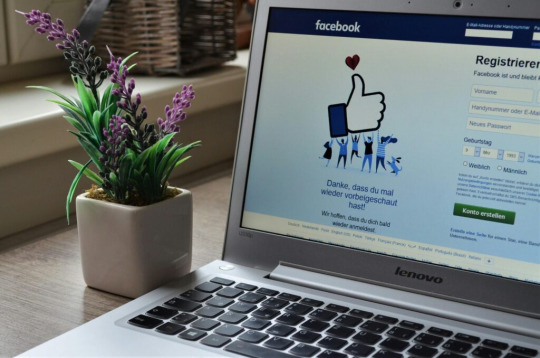
#digital art#digital marketing#graphic designing#social media marketing#web designing#Meta ads#tumblr ads#tumblr graphics#marketing#tumblr things
3 notes
·
View notes
Text
IPTV Codes for Android Devices
https://iptvtunes.com/
Are you feeling restricted by the limited channel options on your Android device? Have you ever pondered the possibility of expanding your streaming choices affordably? Look no further! This article delves into the realm of IPTV codes designed for Android devices, showcasing the incredible potential they hold for enhancing your entertainment experience.
In essence, IPTV codes open up a vast array of channels, delivering global content directly to your Android device. With just a few codes, you can gain access to a plethora of movies, TV shows, sports events, and more. Picture enjoying premium content without the burden of hefty subscription fees. This article provides a comprehensive breakdown, guiding you through the process of acquiring and utilizing IPTV codes on your Android device.

Understanding IPTV Codes
IPTV codes play a pivotal role in enhancing the functionality of IPTV on Android devices. Essentially, these codes serve as keys to unlock a vast array of channels, content libraries, and features. The benefits they bring to the table are not only significant but also contribute to the growing popularity of IPTV among Android users.
How to Find and Use IPTV Codes
IPTV (Internet Protocol Television) codes, also known as IPTV subscription codes or M3U codes, are alphanumeric strings that provide access to IPTV services. Please note that using IPTV codes to access content without proper authorization may violate copyright laws and terms of service, so it’s important to use them responsibly and within legal boundaries.
To Become iptv Reseller
Here’s a general guide on how to find and use IPTV codes:
Finding IPTV Codes:
Online Forums and Communities:
Many IPTV users share codes and playlists on forums and online communities. Look for IPTV-related forums or groups where users share their experiences and codes.
Social Media:
Platforms like Reddit, Twitter, and Facebook have communities dedicated to IPTV. Search for keywords like “IPTV codes” or “IPTV playlists” to find relevant discussions.
IPTV Providers:
Some IPTV service providers offer free trial codes to potential customers. Check the official websites of reputable IPTV services to see if they provide trial codes.
YouTube Tutorials:
YouTube often has tutorials and videos where users share IPTV codes. Be cautious and verify the legitimacy of the source before using any codes.
Using IPTV Codes:
M3U Playlist URL:
The most common form of IPTV codes is the M3U playlist URL. It is a text file that contains information about the channels and streams. Copy the M3U URL provided by the code.
IPTV Player:
Use an IPTV player or application to input the M3U URL. Popular players include VLC, Kodi, IPTV Smarters, and others. Download and install the player on your device.
Player Configuration:
Open the IPTV player and locate the option to add a new playlist or source. Paste the M3U URL into the designated field.
Verify and Save:
Verify that the playlist is working by checking a few channels. Save the playlist, and the player will usually refresh to display the available channels.
Enjoy IPTV:
Once the playlist is added successfully, you can start enjoying IPTV channels. Navigate through the channels using the player’s interface.
IPTV Services What You Need to Know Related To IPTV
Important Considerations:
Legal and Ethical Use:
Ensure that you have the legal right to access the content. Avoid using codes that provide unauthorized access to copyrighted material.
Security:
Be cautious about the sources from which you obtain IPTV codes. Avoid sharing personal information, and use reputable sources to minimize security risks.
Quality and Reliability:
Consider using reputable IPTV services to ensure better content quality, reliability, and customer support.
Top IPTV Codes for Android Devices
Navigating through the myriad of available IPTV codes can be overwhelming. To simplify your choices, we review some of the top IPTV codes for Android, comparing their features and performance. This section acts as a comprehensive guide for users looking to make informed decisions.
Tips for Optimizing IPTV Experience on Android
While IPTV codes enhance your streaming experience, it’s crucial to optimize the overall performance on your Android device. Learn about compatibility, and gain insights into troubleshooting common issues to ensure a seamless and enjoyable IPTV experience.
Legal Considerations and Best Practices
Before delving deeper, it’s essential to address the legality of IPTV codes. This section outlines the legal landscape and provides best practices for responsible use, ensuring users stay within the bounds of the law while enjoying IPTV content on their Android devices.
Future Trends in IPTV Technology
As technology advances, so does the world of IPTV. Explore the evolving features and anticipated developments in IPTV for Android devices, providing readers with a glimpse into the future of streaming technology.
User Reviews and Recommendations
Real-world experiences matter. This section showcases user reviews and recommendations, offering valuable insights from those who have explored the world of IPTV on their Android devices. Learn from their experiences and make informed choices.
Conclusion
In conclusion, IPTV codes for Android devices open up a world of entertainment possibilities. Recap the benefits and express final thoughts on how these codes revolutionize the way we consume digital content.
https://iptvtunes.com/
#iptv usa#iptv subscription#iptv firestick#iptv#adult iptv#iptv m3u#best iptv#iptv in 2023#movies#tv series
2 notes
·
View notes
Text
This is generally my intuitive reaction (looking something up), and has been since I was tall enough and strong enough to pull my mom's complete Merriam-Webster down from the bookshelf without dropping it (and subsequently, when AOL search became eclipsed by AskJeeves and Google for usefulness).
I was an innate question-asker, though, who constantly got in trouble as a child for asking adults "but why?" ad nauseum. My curiosity was encouraged as an adolescent and tween. As a teenager, I was taught to "trust, but verify" authority figures & sources (ironic, given that phrase's provenance and the topic at hand).
So I unreservedly agree with OP that it's important to train yourself to admit you don't know everything and seek out further information.
However, I have three points about why telling people to "look it up" is not a helpful response on its own in this day and age:
Most people don't actually know how to look things up, really. Not in a way that enables actual verification of information. When I was in middle school, we literally had a special class session where we went to the school library, homeroom by homeroom, and were actually taught how to use search engines, how to structure a search query (e.g. using boolean operators), which search engines were reliable & for what information (this was back when search engines were still developing & decentralized and Encyclopedia Brittanica was still a valuable resource), and how to evaluate the reliability of each internet source. A modern day version of this would probably include a lecture on ChatGPT not being a reliable source of information, with examples. I was very, very lucky that I went to a fancy private school that year, which had the resources to teach this lesson. Most current schools probably do not, and I'd wager the majority of adults in this world also never had this lesson.
Google is so, so fucking shitty these days. Like so unbelievably shitty on its own, even if it were possible to turn off its even shittier Gemini AI, which you can't reliably do on mobile (and mobile web traffic makes up for the majority of web traffic these days). The UI is ass on mobile. The quality of its search results are poor if you aren't being specific and granular with your search (and sometimes even if you are, it just ignores your specifications in favor of broader search terms). If you are careful and specific and granular, the results it returns are largely pay-to-play, unless you're going to the effort of restricting it to a specific site (e.g. Reddit, AP News, a specific hobby forum board, etc). It also artificially restricts the amount of results you get (remember when a search would return 13+ pages of results? Pepperidge Farm remembers). And, it no longer allows you to view the cached version of web pages.
The alternatives are even worse. In spite of how shitty Google is, they still imo have the best and most comprehensive web crawlers of the lot. Bing is an exercise in stupidity and frustration (terrible search algorithm). DuckDuckGo is missing search results that should be there (no surprise, its primary index is powered by Bing, though it does allegedly pull from other sources). Every other possible search engine is much more limited in indexes, or has other major issues (e.g. Yandex is Russian, Kagi is paid, StartPage uses Google, and also good luck finding a Facebook post you saw once if you want to double-check something for misinformation), and they all require someone to be informed and aware enough to know about small alternative search engines. Informed and aware people aren't the type of people who need to be told to look something up.
It's a shitty problem and I have no good solutions. If anyone does have a good solution, I would welcome it, because by God I am so fucking tired of this modern internet hell.
It is incredibly important to train yourself to have your first instinct be to look something up.
Don't know how to do something? Look it up.
See a piece of news mentioned on social media? Look it up.
Not sure if something is making it to the broader public consciousness, either because you don't see it much or you see people saying nobody is talking about it? Look it up.
Don't know what a word means? Look it up.
It will make you a better reader and a better writer, but it will also just make you more equipped to cope with the world.
So often, I see people talking about something as though it is the first time anyone has ever acknowledged it, when I've been reading reports about it on the news for months or years. Or I see someone totally misinterpreting an argument because they clearly don't know what a word means--or, on the other hand, making an argument that doesn't make sense because they aren't using words the right way.
Look things up! Check the news (the real news, not random people on social media)! Do your research! You (and the world) will be better for it.
#enshittification#misinformation#propaganda#long post#sorry i popped off. i just have a lot of feelings about this as i watch my friends and peers fall for propaganda.#or else become radicalized in a harmful way (to themselves or others) because they lack the information for a complete picture of an issue–#–and arent informed enough to *know* they're lacking important contextual information#and i quite literally do not have the energy or time to do the research for them and present my complete case when i know they won't listen#there is very little in this world as dangerous as a righteous fool#i am not immune to propaganda or misinformation either#the difference is that i *acknowledge* that and i keep quiet about things i dont have a very strong background in#and then i actually do my fucking research to verify things
23K notes
·
View notes
Text
Choosing the Right Keywords for Notasulga-Based Audiences
Accuracy has been tantamount throughout the digital advertising arena. So for PPC services in Notasulga, you don't want to cast a wide net; it is all about choosing the right person with the right intent. For local Notasulga businesses in Alabama, there is a big difference between just some keywords being an ad wasting-your-money and others triggering actual conversions.
Let's look at how to unearth keywords, refine them, and finally deploy keywords that will genuinely hit home for your Notasulga audience.
Why Local Keyword Targeting Matters?
Notasulga is not New York or Los Angeles. And that is not a disadvantage; rather, it is an opportunity. Smaller towns are very much community-centered, and locals tend to search with local intent. Things they may search could include: "best auto repair Notasulga," "Notasulga flower delivery," or "home cleaning near me."
Here's why this is important:
Lower competition: Fewer businesses bidding on the same terms means CPC goes down.
Higher conversion: You're targeting those who are close by, motivated, and ready to act.
Better ROI: Localized campaigns tend to have much better returns because of tighter audience relevance.
Step 1: Start With Local Intent
Before we begin by opening Google Keyword Planner or SEMrush, we need to understand how residents of Notasulga perform searches. Most times, they:
Add "Notasulga" to the search.
Use terms like "near me" or "closest".
Search for working solutions for problems, not general services.
Examples:
"Emergency plumber Notasulga"
"Where to buy birthday cake Notasulga"
"Notasulga dog grooming reviews"
These are long-tail keywords with a purchase intent, which is exactly what PPC thrives upon.

Step 2: Use Tools but Think Like a Human
Google Keyword Planner is a treasure; however, data stay useless without campaigns built around them. Try to see how tools interact with common and community insights:
Google Trends (apply local filters): Shows when and where keyword searches spike.
Autocomplete and People Also Ask: Great for natural phrasing.
Local forums/Facebook groups: Real people, real language.
Competitor Research: What keywords are other Notasulga businesses using in their ads or meta tags?
Bonus: If you run a local business, ask your customers how they found you; sometimes their words make the best keywords.
Step 3: Classify Keywords by Intent
Not all keywords are equal. Here's how to segment them for better PPC strategy:
1. Commercial Keywords
These show purchase interest, or an interest in obtaining a service.
Examples:
"buy used car Notasulga"
"Notasulga dental cleaning cost"
Use such keywords in Google Search campaigns with direct call-to-actions.
2. Navigational Keywords
The user already knows your brand or type of business.
Examples:
"Notasulga Public Library hours"
"Joe's BBQ Notasulga menu"
Great for brand awareness or local site extensions.
3. Informational Keywords
This is for top-funnel users-e-appropriate for display and remarketing ads.
Examples:
"how to fix AC in Alabama heat"
"best grass for Notasulga lawns"
These could be used to generate interest and for retargeting later.
Step 4: Use Geo-Modifiers Intelligently
Geo-modifiers (words for locations) are your essential allies while providing Notasulga PPC services. Variations include:
"near Notasulga"
"Notasulga AL"
"East Alabama"
Also, think hyper-local. If someone is attempting to seek a service around a particular road or neighborhood - something like "PPC agency near Highway 14" - that could be worth considering if it arises during your keyword research.
Step 5: Analyze and Refine
You can't put up a PPC campaign and expect it to do well as it is. Once your campaign is launched:
Monitor CTR (Click-Through Rate) for each keyword.
Check Quality Scores — Google rewards high-relevance keywords through lower cost.
Implement Negative Keywords against unwanted traffic (e.g., if you're into high-end bouquets, block out search phrases like "cheap flowers Notasulga").
Opportunity for refinement is where many campaigns either live or die. Check back on your keyword list every 1 or 2 weeks in the first few months.
Step 6: Match Type Matters
We can state that there are three major match types in Google ads:
Broad Match: It captures wide variations but often garners irrelevant clicks.
Phrase Match: The middle ground between these two. Ads show when searched phrases are used.
Exact Match: Best for surgical hit and intention.
Starting out in Notasulga PPC services, start with phrases and exact match to control budget; then test broad match after developing a long list of negative keywords.

Step 7: Don’t Sleep on Local SEO Integration
Great PPC and strong local SEO work hand-in-hand. Why?
Because:
After seeing a brand ad, users tend to Google it.
NAP consistency is a trust boaster.
Local landing page having keyword-rich content with real value for users results in better Quality Scores.
Consider creating geo-targeted pages optimized around keywords for:
"Notasulga roof repair"
"Notasulga event photography"
"Best pest control Notasulga"
These name searches tie into both your Ads relevance and against organic listings.
Final Thoughts
Keywords, whether for ppc services not really for Notasulga, will always cast an anchor of relevance rather than volume. The relevance, in this case, must be extremely high. Understand how your neighbors perform searches; decide on a razor-edge strategy picking on those local mannerisms; and keep on optimizing it.
Being very much tied into the community, in Notasulga, using local language and intent-driven keywords does more than just improve CTR — it builds trust.
Our ppc services not really for Notasulga lineup is here for you to create less expensive campaigns with that local touch. Everything, from choosing the right keywords up until conversion tracking, is done by us to keep every single click count locally.
Want to know more about our PPC Management and Services? Please read our next blog in this series “How PPC Services Notasulga Drive Results Without Wasting Spend?” and Stay Tuned!
0 notes
Text
Meta’s online ad library shows the company is hosting thousands of ads for AI-generated, NSFW companion or “girlfriend” apps on Facebook, Instagram, and Messenger. They promote chatbots offering sexually explicit images and text, using NSFW chat samples and AI images of partially clothed, unbelievably shaped, simulated women.
Many of the virtual women seen in ads reviewed by WIRED are lifelike—if somewhat uncanny—young, and stereotypically pornographic. Prospective customers are invited to role-play with an AI “stepmom,” connect with a computer-generated teen in a hijab, or chat with avatars who promise to “get you off in one minute.”
The ads appear to be thriving despite Meta’s ad policies clearly barring “adult content,” including “depictions of people in explicit or suggestive positions, or activities that are overly suggestive or sexually provocative.”
That’s created a new front in debates over the clash between AI and conventional labor. Some human sex workers complain that Meta is letting chatbots multiply, while unfairly shutting their older profession out of its platforms by over-enforcing rules about adult content.
“As a sex worker, if I put anything like ‘I will do anything for you, I will make you come in a minute’ I would be deleted in an instant,” says Gemma Rose, director of the Pole Dance Stripper Movement, a UK-based sex-worker rights and pole-dance event organization.
Meta’s policies forbid users from showing nudity or sexual activity and selling sex, including sexting. Rose and other sex-worker advocates say the company seems to apply a double standard in permitting chatbot apps to promote NSFW experiences while barring human sex workers from doing the same.
People who post about sex education, sex positivity, or sex work have for years complained the platform unfairly quashes their content. Meta has limited some of Rose’s posts from being shown to non-followers, screenshots seen by WIRED show. Her personal Instagram account and one for her organization have previously been suspended for violating Meta policies.
“Not that I agree with a lot of the community guidelines and rules and regulations, but these [ads] blatantly go against their own policies,” says Rose of the sexual chatbots promoted on Meta platforms. “And yet we’re not allowed to be uncensored on the internet or just exist and make a living.”
WIRED surveyed chatbot ads using Meta’s ad library, a transparency tool that can be used to see all the ads currently running across its platforms, all ads shown in the EU in the past year, and past ads from the past seven years related to elections, politics, or social issues. Searches showed that at least 29,000 ads had been published on Meta platforms for explicit AI “girlfriends,” with most using suggestive, sex-related messaging. There were also at least 19,000 ads using the term “NSFW” and 14,000 offering “NSFW AI.”
Some 2,700 ads were active when WIRED contacted Meta last week. A few days later Meta spokesperson Ryan Daniels said that the company prohibits ads that contain adult content and was reviewing the ads and removing those that violated its policies. “When we identify violating ads we work quickly to remove them, as we’re doing here,” he said. “We continue to improve our systems, including how we detect ads and behavior that go against our policies.”
However, 3,000 ads for “AI girlfriends” and 1,100 containing “NSFW” were live on April 23, according to Meta’s ad library.
WIRED’s initial review found that Hush, an AI girlfriend app downloaded more than 100,000 times from Google’s Play store, had published 1,700 ads across Meta platforms, several of which promise “NSFW” chats and “secret photos” from a range of lifelike female characters, anime women, and cartoon animals.
One shows an AI woman locked into medieval prison stocks by the neck and wrists, pledging, “Help me, I will do anything for you.” Another ad, targeted using Meta’s technology at men aged 18 to 65, features an anime character and the text “Want to see more of NSFW pics?”
Several of the 980 Meta ads WIRED found for “personalized AI companion” app Rosytalk promise around-the-clock chats with very-young-looking AI-generated women. They used tags including “#barelylegal,” “#goodgirls,” and “teens.” Rosytalk also ran 990 ads under at least nine brand names on Meta platforms, including Rosygirl, Rosy Role Play Chat, and AI Chat GPT.
At least 13 other apps for AI “girlfriends” have promoted similar services in Meta ads, including “nudifying” features that allow a user to “undress” their AI girlfriend and download the images. A handful of the girlfriend ads had already been removed for violating Meta’s advertising standards. “Undressing” apps have also been marketed on mainstream social platforms, according to social media research firm Graphika, and on LinkedIn, the Daily Mail recently reported.
Some users of so-called AI companions say they can help combat loneliness, with others reporting them feeling like a real partner. Not all of the ads found by WIRED promote only titillation, with some also suggesting that an explicit AI chatbot could provide emotional support. “Talk to anyone! You’re not alone!” reads one of Hush’s ads on Meta platforms.
Carolina Are, an innovation fellow researching social media censorship at the Center for Digital Citizens at Northumbria University in the UK, says that Meta makes it extremely difficult for human sex workers to advertise on its platforms, she says. “When people are trying to work through and profit off their own body, they are forbidden,” says Are, who has helped sex workers reactivate lost and unfairly suspended accounts on Meta platforms. “While AI companies mostly powered by bros that exploit images already out there are able to do that.”
Are says the sexually suggestive AI girlfriends remind her of the unsophisticated and generic early days of internet porn. “Sex workers engage with their customers, subscribers, and followers in a way that is more personalized,” she says. “This is a lot of work and emotional labor beyond the sharing of nude images.”
Limited information is available about how the AI apps are built or the underlying text or image-generation algorithms trained. One used the name Sora, apparently to suggest a connection to OpenAI’s video generator of that name, which has not been publicly released.
The developers behind the apps advertising explicit AI girlfriends are shadowy. None of the developers listed on Google Play or Facebook as creating the apps promoted on Meta’s platforms responded to requests for comment.
Mike Stabile, director of public affairs at the Free Speech Coalition, an adult-industry nonprofit trade association, sees the apps promising explicit AI girlfriends and their advertising tactics as “scammy.” While the adult industry is banned from advertising online, AI apps are “flooding the zone,” he says. “That’s the paradox of censorship: You end up censoring or silencing an actual sex worker and allowing all these weeds to flourish in their place.”
Anti-sex-trafficking legislation signed into US law in 2018 called FOSTA-SESTA made platforms responsible for what is posted online, vastly limiting adult content. However, it resulted in consensual sex work being treated as trafficking in the digital world, shutting adult content creators out of online life and making already marginalized sex workers more vulnerable.
If Meta wipes the AI girlfriend ads from its platforms, it might emulate past sweeps of human sex workers. Despite diligently trying to follow Meta’s guidelines, the Pole Dance Stripper Movement’s account was banned “without warning” during a wave of removals of at least 45 sexuality-related accounts in June 2023, Rose says. Meta eventually rolled back some of the deletions, citing an error. But for sex workers on social media, such events are a recurring feature.
Rose’s personal account and its backup were also deleted in June 2021 during the Covid pandemic after she shared a photo, she says, of a pole-dancing workshop. She was hosting online pole-dancing classes and posting on the adult subscription site OnlyFans at the time. “My business was gone overnight,” she says. “I didn’t have a way to sustain myself.”
“OK, so I got deleted,” Rose adds. “But these companies are allowed to put out this kind of shit that sex workers aren’t allowed to? It makes no sense.”
4 notes
·
View notes
Text
This day in history

Tomorrow (November 27), I'm appearing at the Toronto Metro Reference Library with Facebook whistleblower Frances Haugen.
On November 29, I'm at NYC's Strand Books with my novel The Lost Cause, a solarpunk tale of hope and danger that Rebecca Solnit called "completely delightful."

#20yrsago Big Mouth Billy Bass runs Linux, does impressions https://web.archive.org/web/20031123212606/http://bigmouth.here-n-there.com/
#10yrsago Pratchett’s “Raising Steam”: the magic of modernity https://memex.craphound.com/2013/11/27/pratchetts-raising-steam-the-magic-of-modernity/
#10yrsago NSA spied on non-terrorist “radicalizers”‘ porn use in order to discredit them https://www.huffpost.com/entry/nsa-porn-muslims_n_4346128
#10yrsago Public Citizen threatens legal action against Kleargear on behalf of customers https://www.techdirt.com/2013/11/26/public-citizen-suing-behalf-customers-whose-credit-was-ruined-kleargears-3500-bad-review-fee/
#10yrsago Beasties/GoldieBlox debunked https://waxy.org/2013/11/goldieblox_and_the_three_mcs/
#5yrsago Billboards are using sensors to identify, target and track individuals https://onezero.medium.com/irl-ads-are-taking-scary-inspiration-from-social-media-7088e8241beb
#5yrsago Man arrested for rape after his Playstation mic allegedly broadcast audio from the crime to other players https://arstechnica.com/gaming/2018/11/a-hot-playstation-mic-captures-sounds-of-apparent-rape-leads-to-arrest/
#5yrsago Amnesty will stage global protests over Google’s spying, censoring Chinese search engine plan https://theintercept.com/2018/11/26/google-dragonfly-project-china-amnesty-international/
#5yrsago Supreme Court looks ready to let customers sue Apple for abusing its App Store monopoly https://gizmodo.com/supreme-court-appears-to-lean-heavily-against-apples-de-1830662533?IR=T
#5yrsato A visual guide to America’s concentrated, uncompetitive markets https://concentrationcrisis.openmarketsinstitute.org
#5yrsago US tax shortfalls have our public schools begging for donations https://truthout.org/articles/bake-sales-cant-fix-school-funding-pinch-caused-by-corporate-tax-cuts/
#5yrsago Using information security to explain why disinformation makes autocracies stronger and democracies weaker https://memex.craphound.com/2018/11/27/using-information-security-to-explain-why-disinformation-makes-autocracies-stronger-and-democracies-weaker/
#5yrsago The Fifth Risk: Michael Lewis explains how the “deep state” is just nerds versus grifters https://memex.craphound.com/2018/11/27/the-fifth-risk-michael-lewis-explains-how-the-deep-state-is-just-nerds-versus-grifters/
#1yrago Poe vs. Property https://pluralistic.net/2022/11/27/poe-vs-property/
6 notes
·
View notes
Text
How to Effectively Use Denote Ad Library for Ad Research
Denote Ad Library is a useful tool for researching ads, providing access to a large collection of ads from platforms like TikTok, Meta (Facebook/Instagram), and YouTube. It helps users explore trends, analyze competitors’ strategies, and find effective ad creatives by filtering ads based on platform, format, category, and call-to-action.
Denote automatically saves ads from Facebook, TikTok, and Instagram, allowing users to easily track competitor ads and get detailed ad analysis reports. The AI in Denote can also analyze ad creatives, generate new scripts, and help teams collaborate effortlessly.
If you’re looking for Facebook Advertising Consulting Services in Kochi, Kerala, India, you can easily connect with eWoke, which specializes in Facebook ads strategy, campaign management, and optimization. These services can help you target the right audience, create engaging ad creatives, and improve the performance of your campaigns. By working with local consultants, you’ll benefit from tailored solutions that suit the unique market dynamics of Kochi and Kerala.
Here is how Denote Ad Library can be helpful for ad research:
Competitive Analysis
You can search for your competitors to see their ad deeply. This helps you understand which platforms they are using, what ad formats they prefer, and how they communicate with their audience through messaging and creative elements.
Trend Identification
Denote lets you explore trending ads to spot new ad formats, messaging styles, and creative techniques that are gaining popularity with audiences. This helps you stay updated with the latest marketing trends.
Ad Creative Inspiration
Looking for ideas for your next ad? Denote shows successful ad creatives, including visuals, text, and calls-to-action, giving you inspiration for your own campaigns.
Ad Performance Insights
You can track how long ads have been running. This gives you clues about their performance and whether the advertisers are continuing to optimize their campaigns.
Performance Tracking Over Time
By looking at how competitors adjust their ads over time, you can understand what works best and learn from their ongoing optimization efforts. This helps you refine your strategies and improve your ad performance over time.
Denote Ad Library not only helps you spy on competitors but also gives you the tools to enhance your own ad campaigns by learning from what’s working in the market. Whether you’re looking for creative ideas, targeting strategies, or performance insights, Denote can make your ad research more effective and efficient.
eWoke offers expert Digital Marketing Consulting Services in Kochi, Kerala, helping businesses enhance their online presence, optimize campaigns, and drive growth through tailored strategies for SEO, social media, and paid ads.
0 notes
Text
Why Should You Use Google Ads Editor for Your Campaigns?

In the fast-paced realm of digital marketing, where precision and agility are paramount, Google Ads Editor emerges as a strategic powerhouse for campaign management. When milliseconds can define market dominance, relying solely on browser-based interfaces is no longer sufficient. A tool that empowers advertisers to operate offline, make bulk changes swiftly, and streamline their workflows is not merely a convenience—it’s a necessity.
Its functionality supports marketers in managing complex account structures, ensuring error-free campaign deployment while working in high-pressure environments. With its robust features and intuitive design, advertisers gain a competitive edge through seamless optimization and operational efficiency.
Unlocking the Core Features and Strategic Value
Ads Editor of Google allows users to download their entire account and make bulk changes offline. This includes editing ad groups, updating bids, adjusting targeting, and even crafting new campaigns without affecting live data until you're ready. Some standout features include:

Bulk Editing: Modify thousands of ads or keywords simultaneously.
Advanced Filtering: Easily locate elements using powerful search tools.
Error Detection and Custom Rules: Identify issues before changes go live.
Cross-Account Copying: Seamlessly replicate campaigns across multiple accounts.
Offline Access: Work from anywhere, regardless of internet connectivity.
Spec-wise, it performs best on a 64-bit system (Windows 10+ or macOS 11+), with 8 GB RAM or more and SSD storage. For agencies and enterprises, this results in quicker campaign deployment, enhanced accuracy in implementation, and reduced operational delays—ensuring a smoother and more reliable advertising workflow.
The software becomes even more impactful when integrated into broader task management strategies, improving schedule adherence, workflow automation, and operational clarity.
Top 3 Tools That Complement Your Ad Campaign Management
While offline editing and bulk campaign control offer a major advantage, using additional tools can significantly expand your advertising strategy. The following three platforms are among the most effective for enhancing insight, creativity, and optimization.
#1 PowerAdSpy – Competitive Ad Intelligence Tool

PowerAdSpy provides comprehensive ad intelligence by allowing users to monitor and analyze advertisements across major platforms like Facebook, Instagram, YouTube, and Google. With advanced filtering options by niche, engagement, and ad format, it lets marketers dissect top-performing ads from competitors. This insight helps in designing more effective creatives, refining audience targeting, and aligning strategies with industry trends. By informing ad content and structure, PowerAdSpy lays a strategic foundation for high-performing campaigns.
#2 SpyFu – Deep SEO and PPC Competitive Insights
SpyFu focuses on keyword research and competitive analysis in both organic and paid search spaces. It allows users to see the keywords competitors are buying on Google Ads, how much they’re spending, and which ad variations they’re running. The platform also reveals long-term performance ad trends and backlink strategies. For marketers focused on improving PPC outcomes and dominating search results, SpyFu offers actionable insights that can inform both strategic planning and tactical adjustments.
#3 BigSpy – Cross-Platform Ad Inspiration at Scale

BigSpy is a powerful ad database that tracks millions of ads across platforms such as Facebook, TikTok, Google, Twitter, and Pinterest. Its real-time ad library helps marketers uncover trending content and identify high-converting creatives. With filtering by country, industry, and platform, it enables strategic creative development and testing. BigSpy’s sheer volume of searchable ads makes it a go-to tool for brands seeking inspiration and validation.
Together, these tools contribute essential functions—intelligence gathering, creative testing, and simplified campaign oversight—that elevate your digital advertising efforts. Each enhances a specific phase of the campaign lifecycle, creating a well-rounded, strategic ad management approach.
You can also watch : How to Search Google Ads using PowerAdSpy: A Step-by-Step Tutorial Series
youtube
Final Thoughts
In a landscape where timing, precision, and strategic clarity are non-negotiable, Google Ads Editor delivers a suite of features that modern advertisers cannot afford to ignore. It offers a refined approach to campaign management, freeing marketers from browser limitations and injecting efficiency into every stage of the advertising lifecycle.
For professionals looking to operate at the pinnacle of campaign performance, Ads Editor of Google isn’t just a tool—it’s an essential extension of strategic execution. Its value becomes even more evident in high-stakes scenarios—product launches, seasonal promotions, or rapid-response campaigns—where every second counts and even minor errors can be costly. The ability to draft, review, and deploy changes in a controlled offline environment ensures consistency, accuracy, and speed. By integrating seamlessly into existing workflows, it not only enhances productivity but also empowers teams to execute with confidence, knowing they have full control over every facet of their advertising strategy.
#google ads editor#google ads#google ads editor tutorial#how to use google ads editor#google adwords editor#Youtube
0 notes
Text
How a Digital Marketing Agency Builds Full-Funnel Campaigns That Actually Convert
In digital marketing, generating clicks is easy—conversions, not so much. That’s why the smartest brands today work with a digital marketing agency that understands the power of full-funnel strategy: guiding potential customers from first impression to final sale with intention, precision, and performance at every step.
A full-funnel campaign isn’t just about running ads—it’s about building a cohesive, data-driven journey that nurtures users across every stage of the buyer’s decision-making process.
Here’s how a digital marketing agency builds full-funnel campaigns that don’t just look good—they convert.
Step 1: Understanding the Funnel (Top, Middle, Bottom)
Before anything else, a digital marketing agency maps out the classic marketing funnel:
Top of Funnel (TOFU): Awareness stage—users don’t know your brand yet.
Middle of Funnel (MOFU): Consideration stage—users are evaluating options.
Bottom of Funnel (BOFU): Conversion stage—users are ready to act.
The goal is to craft content, messaging, and targeting strategies tailored to each stage, ensuring that users are moved step-by-step closer to conversion.
Step 2: Audience Research and Segmentation
Effective full-funnel campaigns begin with deep audience understanding.
Agencies:
Build detailed customer personas based on demographics, psychographics, and pain points.
Use first-party and behavioural data to segment audiences (cold, warm, hot).
Identify platform-specific patterns—where each user segment spends time and how they behave.
This segmentation allows the agency to personalise the journey and serve the right message to the right person at the right time.
Step 3: Crafting Stage-Specific Messaging and Creatives
Each funnel stage demands a different tone, value proposition, and creative format:
✅ TOFU – Awareness Campaigns:
Objective: Get on the radar.
Formats: Video ads, blog posts, social reels, influencer content.
Message: Problem education, brand story, emotional appeal.
✅ MOFU – Engagement & Consideration Campaigns:
Objective: Build trust and educate.
Formats: Case studies, webinars, whitepapers, comparison guides.
Message: Why your brand/product is the better choice.
✅ BOFU – Conversion Campaigns:
Objective: Seal the deal.
Formats: Product demos, limited-time offers, retargeting ads.
Message: Clear CTAs, social proof, urgency (“Only 2 left!”).
A digital marketing agency creates asset libraries for each stage, ensuring message consistency across ads, landing pages, and emails.
Step 4: Selecting the Right Channels for Each Stage
Agencies know that platform selection plays a huge role in campaign performance.
TOFU: YouTube, Meta (Facebook/Instagram), TikTok, SEO blog content
MOFU: LinkedIn, email nurturing, lead magnets, SEO/SEM
BOFU: Google Search, remarketing, SMS, WhatsApp automation, affiliate marketing
Each channel is used strategically based on audience intent, engagement level, and content format.
Step 5: Building Landing Pages That Match Funnel Intent
Driving traffic is pointless if the landing page doesn’t convert. A digital marketing agency:
Creates customised landing pages per funnel stage and traffic source
Optimises headlines, CTAs, and form lengths based on user readiness
A/B tests layouts, messages, and visuals continuously
A great landing page speaks the user’s language—and removes friction from the buying process.
Step 6: Integrating Retargeting and Automation
Full-funnel marketing isn’t linear. Some users drop off—others need reminders.
That’s why agencies use:
Pixel-based retargeting (Meta, Google, TikTok) to re-engage users who didn’t convert
Email automation (via tools like Klaviyo or HubSpot) to deliver stage-based nurturing sequences
Dynamic creatives that reflect previous user interactions (e.g., “You left this in your cart…”)
These automated touchpoints keep users moving down the funnel—without overloading internal teams.
Step 7: Tracking, Reporting, and Funnel Optimisation
Building the funnel is just the start. A high-performance digital marketing agency:
Tracks KPIs at each stage: CTR (TOFU), lead quality (MOFU), conversion rate (BOFU)
Monitors drop-off points and user behaviour across channels
Optimises campaigns weekly based on real-time performance data
This ongoing refinement ensures that the funnel isn’t static—it evolves with the user journey and market shifts.
Final Thoughts
A successful full-funnel campaign is less about pushing ads and more about pulling users through a thoughtful journey—from awareness to conversion, and beyond. A skilled digital marketing agency brings strategy, creativity, technical know-how, and relentless optimisation to each layer of the funnel.
Because in today’s market, it’s not enough to get attention—you need to guide it, nurture it, and convert it into measurable business growth.
0 notes